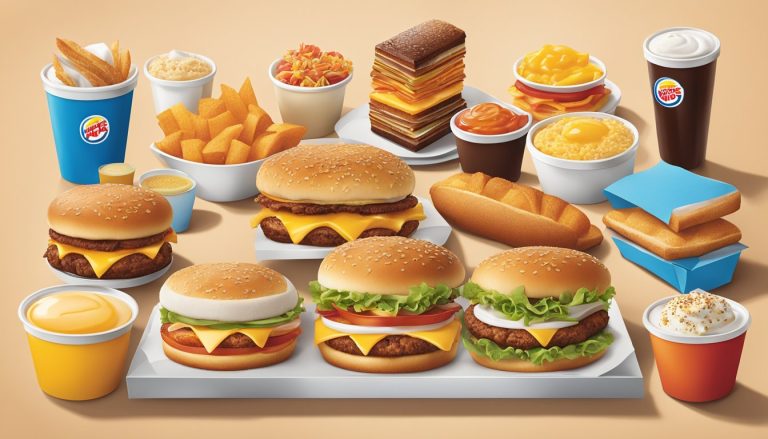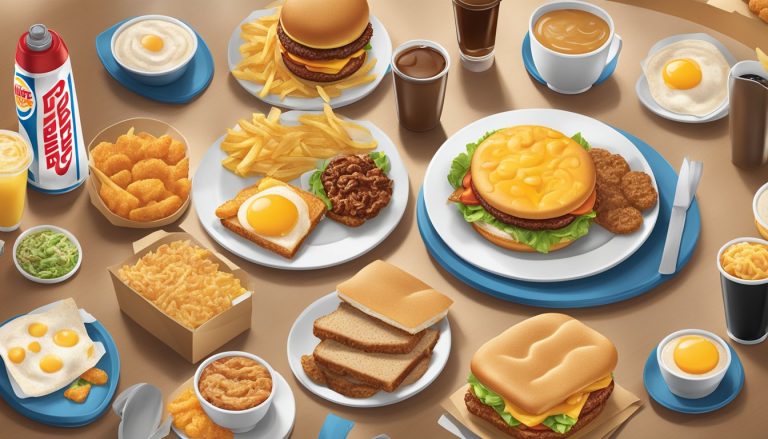Burger King has embraced technology to revolutionize its breakfast preparation processes. From advanced cooking equipment to automated ordering systems, BK leverages cutting-edge tools to enhance efficiency and consistency across its restaurants. These technological innovations allow Burger King to deliver hot, fresh breakfast items quickly while maintaining quality standards.
The fast food giant’s culinary team works diligently behind the scenes to integrate new technologies into breakfast menu development and production. Specialized software helps optimize recipes and streamline ingredient sourcing. Meanwhile, state-of-the-art food processing equipment enables BK to produce breakfast items at scale with precise specifications.
As the restaurant industry becomes increasingly high-tech, Burger King continues to explore emerging technologies to further improve its breakfast offerings. The company invests in research and development to identify innovative solutions for food preparation, packaging, and service. This forward-thinking approach keeps BK competitive in the fast-paced breakfast segment while meeting evolving consumer expectations for speed and quality.
Understanding the Fast Food Landscape

The fast food industry has undergone significant changes in recent decades. Technological advancements and shifting consumer preferences have reshaped the landscape, particularly in the breakfast segment.
Evolution of the Fast-Food Restaurant
Fast food restaurants emerged in the mid-20th century, offering quick, convenient meals at affordable prices. Drive-thru service became popular in the 1970s, further emphasizing speed and convenience.
In the 1980s and 1990s, chains expanded globally, adapting menus to local tastes. The 21st century brought increased focus on health and nutrition, with many restaurants introducing healthier options.
Digital ordering and mobile apps have transformed the customer experience in recent years. Self-service kiosks and AI-powered voice ordering systems are now common in many QSRs.
Burger King in the Fast Food Hierarchy
Burger King (BK) ranks among the top global fast food chains. Founded in 1953, it has grown to over 18,000 locations worldwide.
BK’s signature flame-grilled burgers set it apart from competitors like McDonald’s and Wendy’s. The chain has maintained its position through menu innovation and marketing campaigns.
In the breakfast market, BK faces stiff competition. While not as dominant as McDonald’s in this segment, BK has carved out a niche with items like the Croissan’wich.
Breakfast Market Dynamics
The fast food breakfast market has seen rapid growth since the 1970s. McDonald’s introduction of the Egg McMuffin in 1972 sparked a breakfast revolution in the industry.
Competition in this space is fierce, with chains constantly innovating to attract morning customers. Breakfast now accounts for a significant portion of sales for many QSRs.
Recent trends include all-day breakfast options and healthier menu items. The COVID-19 pandemic disrupted breakfast sales as work-from-home policies changed consumer routines.
Technology plays a crucial role in breakfast preparation and service. AI-powered systems can reduce preparation time by up to 50% in commercial kitchens.
Technological Integration in BK Operations
Burger King has embraced technology across its operations to enhance efficiency and customer satisfaction. The company leverages advanced systems in cooking, supply chain management, and customer service to streamline processes and maintain quality.
Automated Cooking Systems
Burger King utilizes state-of-the-art automated cooking equipment to ensure consistency and speed in food preparation. Flambroilers cook patties to precise specifications, while automated timers and temperature controls maintain food safety standards.
Digital kitchen displays relay orders from the front counter to cooking stations, reducing errors and improving coordination. These systems integrate with inventory management software to track ingredient usage in real-time.
Franchisees benefit from standardized equipment that simplifies training and maintenance. This technology allows BK to serve customers quickly while maintaining food quality across locations.
Supply Chain Management
BK employs sophisticated supply chain technology to optimize inventory and reduce waste. RFID tags and sensors track ingredients from suppliers to restaurants, ensuring freshness and traceability.
Predictive analytics software forecasts demand, helping franchisees order appropriate quantities and minimize spoilage. Cloud-based platforms connect BK with suppliers, facilitating seamless communication and order fulfillment.
These systems enable real-time inventory visibility, allowing for rapid adjustments during supply disruptions or unexpected demand spikes. By leveraging technology, BK maintains cost-effective operations while ensuring ingredient availability.
Customer Service Tech
Burger King has implemented various customer-facing technologies to enhance service and convenience. Self-service kiosks in many locations allow customers to place orders quickly and customize menu items.
Mobile apps and online ordering platforms integrate with in-store systems, enabling seamless pickup and delivery options. Digital menu boards display up-to-date offerings and can be adjusted remotely to highlight promotions.
BK’s loyalty program uses data analytics to personalize offers and track customer preferences. This technology helps franchisees tailor their service to local tastes while maintaining brand consistency across the chain.
BK Breakfast Menu Highlights
Burger King’s breakfast menu offers a diverse range of options to suit different tastes and dietary needs. From classic favorites to health-conscious choices, the menu caters to various preferences while maintaining the brand’s signature flavors.
Health Conscious Selections
BK provides lighter options for health-minded customers. The Maple Flavor Oatmeal is a nutritious choice, packed with fiber and essential nutrients. For those watching their calorie intake, egg white sandwiches offer a protein-rich alternative with reduced fat content.
BK also offers fruit options like apple slices as a side, allowing customers to add vitamins and fiber to their meal. Some breakfast items can be customized to reduce calories, such as opting for English muffins instead of croissants or removing cheese from sandwiches.
Signature Breakfast Items
The Croissan’wich remains a popular BK breakfast staple. This sandwich combines eggs, cheese, and a choice of bacon, sausage, or ham on a flaky croissant. The Spicy Sausage, Egg & Cheese Croissan’wich adds a kick for those who enjoy heat.
French Toast Sticks are another beloved item, offering a sweet option that’s easy to eat on-the-go. Hash Browns complement many breakfast combos, providing a crispy side to sandwiches.
BK’s breakfast value menu includes affordable options like the Bacon, Egg & Cheese Biscuit. This menu aims to provide filling meals at competitive prices.
Beverages and Add-Ons
Coffee is a breakfast essential, and BK offers both hot and iced varieties. Their coffee selection includes regular and decaf options, catering to different preferences.
For those seeking alternatives, BK provides a range of cold beverages including orange juice and milk. These drinks can be added to any breakfast combo or purchased separately.
Additional sides like extra bacon or a second hash brown allow customers to customize their meals. Some locations may offer seasonal beverage specials to complement their breakfast offerings.
Impact on Customer Experience

Burger King’s adoption of technology in breakfast preparation significantly affects customer experience. These innovations enhance service speed, food quality, and order customization.
Speed of Service
Advanced kitchen equipment streamlines breakfast preparation, reducing wait times. Automated toasters and egg cookers ensure consistent cooking times. Digital order displays help staff assemble meals quickly and accurately.
Self-service kiosks allow customers to place orders without waiting in line. This technology reduces bottlenecks during busy morning hours. Mobile ordering apps further speed up the process, letting customers skip the queue entirely.
Improved kitchen logistics, powered by software algorithms, optimize food preparation sequencing. This ensures hot items are ready just as customers reach the counter.
Quality and Consistency
Precision cooking equipment maintains food quality across all Burger King locations. Programmable grills cook meat patties to exact specifications every time. Temperature-controlled warming units keep items at optimal serving temperatures.
Automated ingredient dispensers ensure correct portioning, leading to consistent taste and nutritional content. This technology reduces human error and waste.
Digital recipe displays guide staff through preparation steps, maintaining product standards. Real-time inventory tracking helps managers ensure fresh ingredients are always available.
Customization and Order Accuracy
Digital ordering systems enable easy customization of breakfast items. Touchscreen interfaces allow customers to add or remove ingredients with a few taps.
Order verification screens at drive-thrus reduce miscommunication. Customers can confirm their selections before finalizing purchases.
Kitchen display systems clearly show customized orders to staff. This technology minimizes errors in order assembly, improving customer satisfaction.
Integrated point-of-sale systems track individual preferences. This data enables personalized recommendations and targeted promotions, enhancing the overall customer experience.
Marketing and Branding Strategies

Burger King leverages technology to enhance its marketing efforts and build brand equity. The company employs innovative digital strategies to connect with customers and create a seamless brand experience across platforms.
Leveraging Technology for Marketing
Burger King utilizes social media platforms and mobile apps to engage customers and drive sales. The company’s digital marketing campaigns often incorporate augmented reality features, location-based promotions, and personalized offers. These tech-driven initiatives help Burger King reach younger demographics and tech-savvy consumers.
In 2024, Burger King launched a gamified loyalty program within its mobile app. This program rewards customers for their purchases and encourages repeat visits. The app also enables easy ordering and customization of menu items, enhancing the overall customer experience.
Building Brand Equity through Tech
Burger King’s brand image benefits from its innovative use of technology in advertising and customer interactions. The company’s mission statement emphasizes providing high-quality, great-tasting food with exceptional customer service. Technology plays a crucial role in delivering on this promise.
Digital menu boards in restaurants allow for real-time updates and dynamic pricing. This flexibility enables Burger King to quickly adapt to market conditions and customer preferences. The company also uses data analytics to refine its menu offerings and tailor promotions to specific customer segments.
Burger King’s parent company, 3G Capital, continues to invest in technological advancements to strengthen the brand’s position in the competitive fast-food market. These investments contribute to a positive brand image and increased customer loyalty.
Challenges and Innovations

Burger King faces technological hurdles in breakfast preparation while striving for menu innovation. The company tackles these challenges through strategic solutions and creative product development.
Overcoming Technological Barriers
Burger King employs advanced cooking equipment to streamline breakfast preparation. High-speed toasters ensure consistent results for buns and English muffins. Precision timing systems help staff manage multiple orders simultaneously.
The chain utilizes smart refrigeration units to maintain ingredient freshness. These units monitor temperatures and alert staff to potential issues. Automated coffee brewers ensure a steady supply of hot, fresh coffee during peak hours.
BK also implements digital ordering systems to reduce errors and improve efficiency. These systems integrate with kitchen displays, allowing for seamless communication between front and back-of-house operations.
Menu Innovation and Design
Burger King regularly updates its breakfast menu to stay competitive. The company’s culinary team experiments with new flavor combinations and ingredients to create unique offerings.
Recent innovations include protein-packed breakfast sandwiches and healthier alternatives like fruit smoothies. BK also introduced plant-based options to cater to changing consumer preferences.
The chain focuses on portable breakfast items that appeal to on-the-go customers. Wraps and handheld sandwiches dominate the menu, designed for easy consumption during commutes.
BK’s signature products, like the Croissan’wich, undergo periodic updates to maintain relevance. The company balances tradition with innovation to preserve brand identity while attracting new customers.
Nutritional Analysis and Consumer Health
BK’s technological advancements have enabled more precise nutritional analysis and health-focused menu options. This allows for better control of ingredients and portions to meet consumer health needs.
Reducing Unfavorable Nutrients
BK utilizes automated systems to carefully measure and reduce unfavorable nutrients in breakfast items. Smart kitchen equipment precisely portions ingredients to control calories, fat, cholesterol, and sodium content.
Digital recipe management ensures consistent preparation with pre-programmed amounts of oils and salts. This minimizes excess trans fats and sodium across menu items.
Automated cooking processes help retain nutrients while reducing the need for added fats or oils. Precision temperature controls prevent nutrient loss from overcooking.
Including Healthier Options
BK leverages technology to incorporate more nutritious ingredients into breakfast offerings. Automated inventory systems track and suggest healthier substitutions.
Smart menu boards highlight lower-calorie options and display detailed nutritional information. This empowers customers to make informed choices.
High-tech blending and food prep equipment allows for easy integration of fresh fruits and vegetables into breakfast items. Salad bars use refrigerated units to keep produce fresh.
Protein-rich options like egg whites and lean meats are prepared using specialized cooking equipment to maximize nutritional value. Automated portion control ensures consistent protein servings.
Competitive Analysis

Burger King’s competitive position in the breakfast market hinges on technological innovation and strategic positioning against rivals. Technology plays a crucial role in enhancing operational efficiency and customer experience.
Burger King vs. Its Competitors
Burger King faces stiff competition from industry giants like McDonald’s and emerging fast-food chains. In terms of market share, BK typically ranks third behind McDonald’s and Wendy’s in the U.S. fast-food burger market.
To differentiate itself, Burger King focuses on flame-grilled offerings and customizable menu options. This strategy appeals to consumers seeking unique flavors and personalized meals.
BK’s breakfast menu competes directly with McDonald’s popular breakfast items. The company has expanded its morning offerings to include a wider variety of sandwiches and coffee drinks.
The Role of Technology in Market Positioning
Technology is reshaping Burger King’s market position in the breakfast segment. The company has invested in digital ordering platforms and mobile apps to streamline the customer experience.
These tech innovations allow for faster service and more accurate order fulfillment. BK’s mobile app offers exclusive deals and promotions, helping to build customer loyalty.
In-store, Burger King has implemented digital menu boards and self-ordering kiosks. These technologies reduce wait times and improve order accuracy, addressing key pain points for breakfast customers.
BK’s franchisees benefit from these technological advancements, as they help increase efficiency and reduce labor costs. The company continues to explore AI-driven solutions to further optimize its breakfast operations.
Looking Ahead: The Future of BK Breakfast

Technology will play a crucial role in shaping BK’s breakfast offerings. Innovations in food preparation and personalized experiences will drive growth and consumer engagement.
Emerging Technologies and Trends
BK is exploring AI-powered ordering systems to enhance accuracy and efficiency. Smart kitchen appliances will streamline food preparation, reducing wait times by up to 50%. Personalized nutrition apps may integrate with BK’s menu, offering tailored recommendations based on individual dietary needs.
Voice-activated ordering through smart devices could become a reality, allowing customers to place orders hands-free. BK might introduce 3D food printing for customized breakfast items, catering to unique consumer preferences.
Augmented reality could transform the in-restaurant experience, providing nutritional information and interactive menu exploration.
Sustaining Growth and Consumer Interest
BK will likely focus on global flavor trends to appeal to diverse palates. Plant-based options may expand, meeting the growing demand for sustainable and health-conscious choices.
Data analytics will help BK predict and adapt to changing consumer preferences. This could lead to dynamic menu offerings that change based on time, location, and customer demographics.
BK might introduce subscription-based breakfast plans, ensuring customer loyalty and consistent revenue. Partnerships with food delivery platforms could expand, catering to the increasing demand for convenient, at-home breakfast options.
Sustainability initiatives, such as eco-friendly packaging and locally sourced ingredients, will likely become more prominent in BK’s breakfast strategy.




